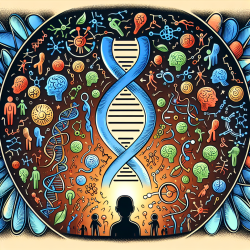Nemaline myopathy (NM) is a rare genetic disorder that presents significant challenges in diagnosis and management, particularly in neonates with hypotonia. This condition is characterized by muscle weakness and respiratory issues, often requiring a comprehensive diagnostic approach. The recent case study titled Nemaline Myopathy in a Hypotonic Neonate: Diagnostic Approach for Early Detection and Management provides valuable insights into the early detection and management of this condition.
The Importance of Early Detection
Early detection of NM is crucial for initiating timely interventions that can significantly improve patient outcomes. The case study highlights the role of rapid genetic testing in expediting diagnosis, reducing invasive procedures like muscle biopsies, and guiding treatment plans. For practitioners, understanding the importance of early genetic testing can lead to more effective management of neonatal hypotonia.
Implementing a Diagnostic Algorithm
The complexity of diagnosing neonatal hypotonia necessitates a structured approach. Practitioners should first rule out life-threatening conditions such as infections or metabolic disorders before proceeding with further tests. A detailed family and medical history, along with neuroimaging and laboratory tests, are essential components of the diagnostic process.
- Family History: Investigate any history of neuromuscular diseases or developmental delays.
- Neuroimaging: Use CT or MRI to identify structural abnormalities.
- Genetic Testing: Trio exome or genome sequencing is recommended as a first-line testing option.
The Role of Multidisciplinary Care
A multidisciplinary approach is vital in managing NM effectively. The involvement of various specialists ensures comprehensive care tailored to the patient's needs. In the case study, the patient benefited from the expertise of speech-language pathologists, occupational therapists, and pulmonologists.
- Speech-Language Pathology: Address feeding issues and orofacial muscle weakness.
- Occupational Therapy: Support motor development and daily living activities.
- Pulmonology: Manage respiratory complications and sleep apnea.
Encouraging Further Research
The variability in NM presentations underscores the need for ongoing research to understand the genetic and environmental factors influencing disease manifestation. Practitioners are encouraged to stay informed about advances in genetic testing and treatment strategies through conferences, publications, and webinars.
The case study serves as a reminder of the potential benefits of early intervention and the importance of a collaborative care model. As our understanding of NM evolves, so too will our ability to provide better care for affected individuals.
To read the original research paper, please follow this link: Nemaline Myopathy in a Hypotonic Neonate: Diagnostic Approach for Early Detection and Management.










